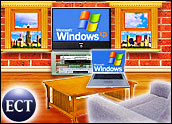
Call it the Pleasure PC. Digital Living Space. Or, as Microsoft would like you to think of it, Media Center. Vendors and analysts have been flagging a new era for home PCs, and there is more than just talk in the air.
Dell, Gateway, and other computer makers are busy touting PCs optimized for entertainment. Intel has developed chipsets with the new types of entertainment PCs in mind. The living room as a promised land for audio, video, and computer technology convergence is closer than one may think.
Market is Ready
Certainly Microsoft aims to make the transformation of PCs into full-blown entertainment systems sooner rather than later. There’s lots of buzz already about its plans to introduce the next big thing in its Media Center Edition 2005, which will be announced officially next week.
Among its new features, the platform will have the ability to play movies, music, digital pictures and television and be controlled via remote control. Running on the Windows XP operating system, Windows XP Media Center Edition 2005 will also reportedly allow consumers to watch one channel while recording another.
Ted Schadler, a principal analyst at Forrester Research who tracks home-entertainment market dynamics, said a number of technology advancements and changes in customer behavior now make home entertainment PCs viable.
Shifts in Behavior
Home-entertainment activity marks a shift in how we use our PCs — physically, Schadler said. In the office tradition, the person goes to the PC and leans forward to work. In the home center construct, the person uses media capabilities from anywhere in the room. Microsoft’s Media Center, for example, sports such remote-control capability.
Schadler pointed to Forrester studies that show the shift toward greater use of PCs for entertainment functions is real. “Customers are sending pictures; they are listening to music this way. We asked households what they are doing online. And larger and larger numbers are using it for home entertainment.”
Technological Advances
Schadler also pointed to advancements in technology that make such use easier and more attractive. “Home networking has made it much easier to move stuff around; a lot of content can now moved on to a hard drive, and there have been improvements in the quality of displays.”
Suffice to say, he stated, that whether one talks about Microsoft, Toshiba, HP, Dell, or Sony, “They are all out to get the PC into the living room.”
Battle of Industries
Where the battle for home-entertainment consumerism will really get interesting, said Schadler, is when competing industries step up to the plate as well. “Cable companies will do their best to keep the PC out of the living room,” he said. “There are already signs of bringing out set-top boxes that would encroach on the PC business. Telcos will also try to compete for the living room, partnering with satellite providers.”









































